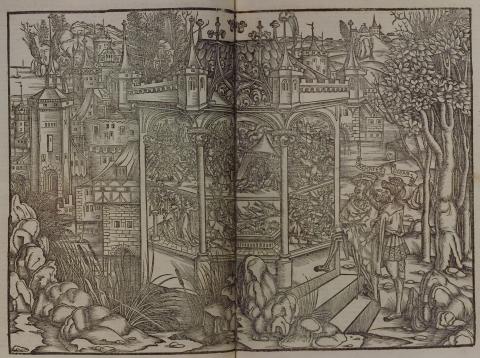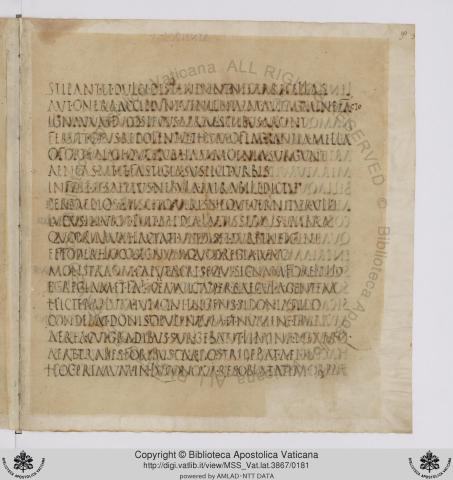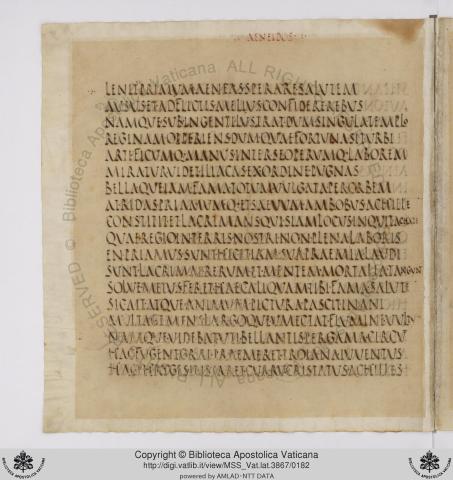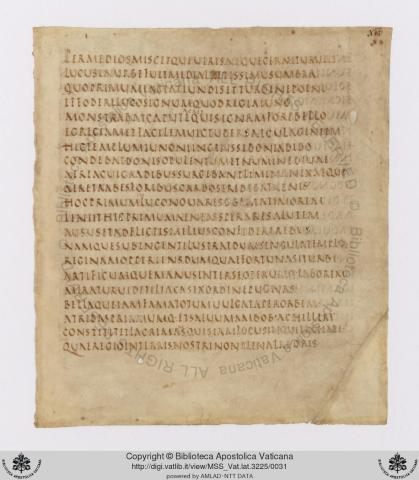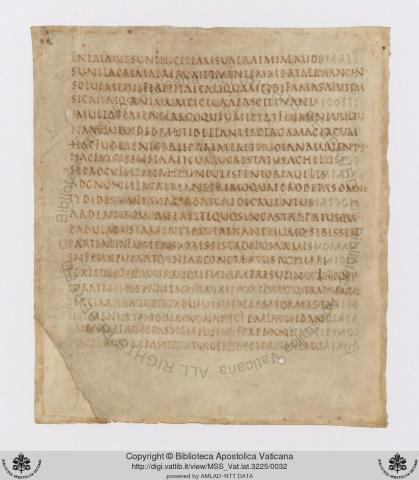CORE VOCABULARY
lūcus, ī, m.: a consecrated wood; sacred grove, 6.259, et al.; in general, a grove, wood, forest.
iactō, āvī, ātus, 1, freq. a.: to throw often or much; toss to and fro; toss, freq.; hurl, cast, 2.459; thrust out, 5.376; aim, 5.433; (fig.), throw out words, utter, say, 1.102; of the mind, revolve, meditate, 1.227; sē iactāre, boast, exalt one's self, rejoice, glory, 1.140; prae sē iactāre, to make pretense of, 9.134; p., iactāns, antis, arrogant, assuming, ambitious, 6.815. (iaciō)
turbō, inis, m.: a tornado, whirlwind; storm, tempest, 1.442; whirling cloud, 3.573; wind accompanying the lightning; lightning-blast, 1.45; 6.594; whirling or stormy force, 11.284, et al.; a whirling top, a child's top, 7.378. (cf. turba)
Poenī, ōrum, m.: the Carthaginians, 1.302; Africans, 12.4.
effodiō, fōdī, fossus, 3, a.: to dig out, excavate, 1.427; dig up, 1.443; dig, thrust out, 3.663. (ex and fodiō)
Iūnō, ōnis, f.: Juno, the Sabine and Roman name for the wife and sister of Jupiter, daughter of Saturn, 1.4, et al.; Iūnō īnferna, the Juno of the lower world, Proserpine, 6.138.
mōnstrō, āvī, ātus, 1, a.: to show, point out, indicate, 1.444; inform, tell, 1.321; direct, incite, 9.44; ordain, appoint, prescribe, 4.636. (mōnstrum)
Sīdōnius, a, um: (adj.), of Sidon; Sidonian; Phoenician, Tyrian, 1.678, et al.
Dīdō, ūs or ōnis, f.: Dido, daughter of Belus, king of Phoenicia, who fled from her brother Pygmalion to Africa, where she founded the city of Carthage, 1.299.
opulentus, a, um: adj. (ops), abounding in means; wealthy, rich, 1.447; mighty, 8.475.
dīva, ae, f.: a goddess, 1.632, et al.
aereus, a, um: adj. (aes), made of copper or bronze; bronze, brazen (see def. of aes), 1.448; brazen beaked, 5.198; of the copper or bronze plates or scales of a corselet, 10.313.
nectō, nexuī, or nexī, nexus, 3, a.: to tie, bind, fasten, 4.239; bind together or round, 1.448; join, unite, of soul and body, 4.695; (fig.), of arguments, 9.219.
trabs, trabis, f.: a beam; timber, 1.552; post, jamb, 1.449; trunk, 6.181; tree, 9.87; ship, 3.191.
foris, is, f.: a door; often in the pl. with reference to double doors, 1.505; door or entrance. (rel. to θύρα)
cardō, inis, m.: a hinge, pivot, 1.449; the socket in which the pivot plays, 2.493; (fig.), a turning point, crisis, emergency, 1.672.
strīdeō, 2, n., and strīdō, strīdī, 3: to produce a grating or shrill sound; to creak, 1.449; gurgle, 4.689; rustle, 1.397; whiz, roar, 1.102; hiss, 8.420; twang, 5.502.
aēnus, a, um: adj. (aes), of bronze; brazen, 2.470; subst., aēnum, ī, n., a bronze or brazen vessel; caldron, 1.213, et al.
lēniō, īvī or iī, ītus, 4, a. and n.: to render mild; allay; soothe, 4.528; quiet, calm, 6.468; of inanimate things, 8.87. (lēnis)
Aenēās, ae, m.: 1. A Trojan chief, son of Venus and Anchises, and hero of the Aeneid, 1.92. 2. Aenēās Silvius, one of the Alban kings, 6.769.
adflīctus, a, um: dejected, desponding, 2.92; wretched, troubled, 1.452. (adflīgō, flīxī, flīctus, 3, a.)
cōnfīdō, fīsus sum, 3, n. and a.: to put entire trust in; to trust in, w. dat. or abl., 1.452, et al.
lūstrō, āvī, ātus, 1, a.: to purify by atonement, 3.279; go round the fields with the victims; hence to bless, ask for a blessing on; go or dance around an altar or the image of a god, 7.391; traverse, pass across, around, or over, 1.608; pass in review, parade before, 5.578; run through, 2.528; search, 1.577; observe, survey, 1.453; watch, mark, 11.763; of the sun, illuminate, 4.607. (lūstrum)
rēgīna, ae, f.: a queen, 1.9; princess, 1.273. (rēx)
opperior, perītus or pertus sum, 4, dep. a. and n.: to wait for, await, 1.454.
artifex, icis, m.: an artist, 1.455; artificis scelus, the iniquity of the deceiver = the accursed falsifier, 11.407; subtle schemer, artful deviser, 2.125. (ars and faciō)
manus, ūs, f.: the hand, 1.487; freq.; (meton.), action, movement of the hand; work, art, handiwork, 3.486; prowess, heroic deed, action, 2.434; force, violence, 2.645; a collection of persons; a band, crew, troop; an army, 2.29; forces, 5.623; multitude, 6.660; pl., manūs, workmen, 11.329; dare manūs, to yield, 11.558; extrēma manus, the finishing hand or touch, 7.572.
Īliacus, a, um: (adj.), belonging to Ilium; Ilian, Trojan, 1.97, et al.
vulgō, āvī, ātus, 1, a.: to make common or commonly known; spread abroad, 1.457; divulge, disclose, 10.64. (vulgus)
Atrīdēs, ae, m.: a son or descendant of Atreus; pl., Atrīdae, ārum, the Atridae (Agamemnon and Menelaus), 2.104.
Priamus, ī, m.: 1. Priam, son of Laomedon, king of Troy, 1.458, et al. 2. A Trojan youth, son of Polites and grandson of King Priam, 5.564.
ambō, ae, ō: (adj.), both, 1.458.
Achillēs, is (eos or ī), m.: the son of Peleus, king of Thessaly, and Thetis, daughter of Nereus, 1.468, et al.
lacrimō, āvī, ātus, 1, n. and a.: to shed tears, weep, 1.459. (lacrima)
Achātēs, ae, m.: Achates, a companion of Aeneas, 1.174, et al.
ēn: (interj.), lo! behold! with nom., 1.461; in indignation, 4.597.
mortālia, ium, n.: human affairs; fortunes, woes, 1.462.

